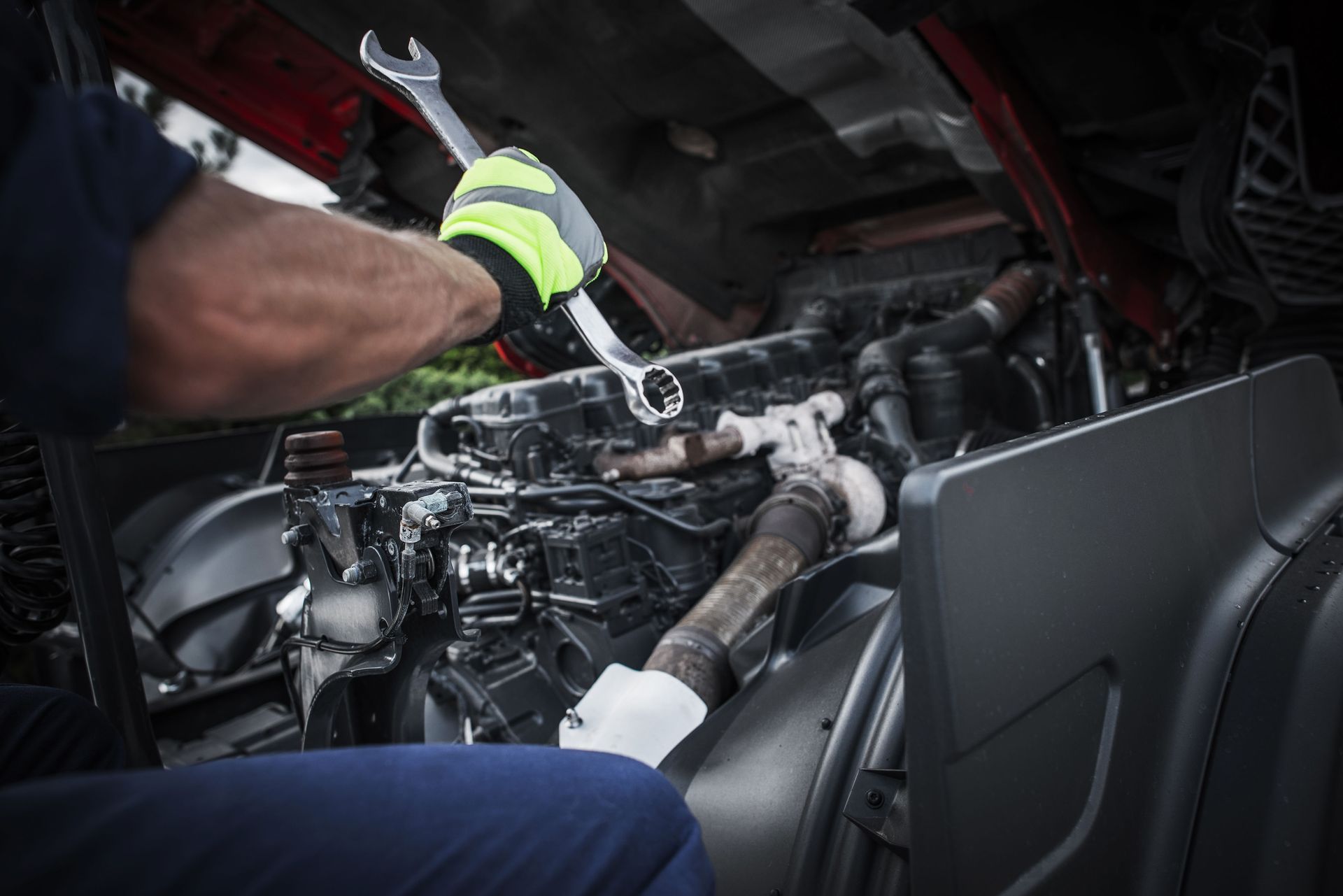October 31, 2025
Maintaining Truck Efficiency with Repair Services
The trucking industry is the backbone of commerce in the United States, moving massive quantities of freight across long distances every day. However, the productivity of this sector relies heavily on the operational status of its fleet. That’s where truck repair services come in—they are more than just mechanics fixing a broken truck; they are essential partners in keeping the supply chain moving efficiently. By maintaining trucks in optimal working condition, these services reduce downtime and ensure that deliveries happen on schedule, which benefits drivers, companies, and customers alike.
According to Geotab, there are 3.54 million drivers employed in the U.S. trucking industry. Imagine the impact if even a small portion of this fleet experienced frequent breakdowns. A single disabled truck on a tight delivery schedule can delay an entire supply chain, creating ripple effects that impact warehouses, retailers, and ultimately consumers. Truck repair services mitigate this risk, supporting both the efficiency and safety of drivers and cargo.
Beyond avoiding delays, these services also improve driver satisfaction. Drivers who can rely on well-maintained trucks experience less stress, fewer unexpected breakdowns, and greater confidence on the road, which directly impacts retention rates and overall fleet performance.
Implementing Preventive Maintenance for Trucks
Preventive maintenance is the foundation of efficient trucking operations. It’s the practice of regularly inspecting, detecting, and correcting potential issues before they evolve into significant problems. In simple terms, it’s about keeping trucks healthy and avoiding costly surprises down the road.
Routine inspections, part replacements, and system checks are all part of preventive maintenance. For trucking companies, this means fewer unexpected breakdowns, better planning, and ultimately, more predictable operations. By staying proactive, fleets not only save money on expensive repairs but also ensure the safety of their drivers and other road users.
Preventive maintenance also improves fuel efficiency. Trucks that are properly tuned, with clean filters, well-maintained brakes, and correctly inflated tires, can significantly reduce fuel consumption. Over the course of a year, this translates into substantial cost savings for fleet operators. In a competitive market where every dollar counts, preventive maintenance is not just a safety measure—it’s a financial strategy. Moreover, consistent preventive care can extend the life of critical engine components, delaying the need for expensive replacements and maximizing the value of each vehicle in the fleet.
Identifying Early Truck Problems
Many truck issues start small but can escalate quickly if left unchecked. Early identification of problems like engine inefficiencies, brake wear, or tire damage is key to preventing major downtime. Routine diagnostic checks allow technicians to catch these issues before they become serious.
Take brake systems, for example. A truck traveling hundreds of miles daily experiences constant wear on its braking components. Ignoring small signs of wear can lead to total brake failure, which not only endangers the driver and others on the road but also results in lengthy repairs and lost revenue. By identifying such problems early, truck repair services save fleets from unplanned expenses and logistical headaches.
Similarly, engine performance issues can go unnoticed until they cause a breakdown. Routine monitoring, including oil analysis and engine diagnostics, helps detect early signs of trouble. Technicians can then address the problem before it escalates, keeping the truck running safely and efficiently. Catching these problems early also allows fleet managers to schedule repairs during off-peak hours, minimizing disruptions to daily operations and maintaining consistent delivery schedules.
Utilizing Quality Parts and Repairs
The effectiveness of truck repairs often depends on the quality of the parts used. High-quality or OEM (Original Equipment Manufacturer) parts are designed to fit specific truck models perfectly, ensuring long-lasting performance and reducing the likelihood of repeat repairs. While aftermarket parts might be cheaper initially, they often lead to frequent maintenance issues that result in more downtime.
Reputable truck repair services make it a priority to use quality parts and reliable repair techniques. This attention to detail ensures that trucks stay on the road longer and operate at peak efficiency, which directly supports the productivity of trucking companies.
Consider a fleet replacing turbochargers or brake systems. Investing in OEM components can mean the difference between a repair lasting for years or failing after only a few thousand miles. In the long run, spending a little more upfront reduces costs, downtime, and frustration, and it fosters trust between trucking companies and their drivers. High-quality repairs also contribute to better resale value for trucks, which is another indirect financial benefit that fleet operators often overlook.
Leveraging Technology for Efficient Repairs
Technology has transformed how truck repairs are handled. Modern diagnostic tools, telematics systems, and mobile apps allow technicians to detect problems faster and with greater accuracy. For example, telematics systems monitor engine performance, fuel efficiency, and other vital components in real time. Mobile apps let drivers quickly report issues, request assistance, and even track repair progress.
These tech-enabled approaches save significant time and prevent prolonged downtime, ensuring that trucks get back on the road as quickly as possible. Trucking companies that integrate these tools enjoy smoother operations and more predictable delivery schedules.
One notable advancement is predictive maintenance. By analyzing historical performance data, repair services can anticipate when a component is likely to fail and schedule service before a breakdown occurs. This proactive approach not only reduces downtime but also helps companies plan more efficient maintenance schedules, saving both time and money. Additionally, technology helps track service histories, making it easier for fleet managers to evaluate repair trends and optimize their maintenance strategies.
Managing Emergency Repairs Effectively
Even with preventive maintenance, emergencies can happen. Flat tires, unexpected engine failures, or brake problems require immediate attention. Fast, coordinated response is critical. 24/7 on-road assistance services mean that trucks can be serviced wherever and whenever needed.
Efficient emergency management reduces disruption to delivery schedules and helps trucking companies maintain their commitments. For long-haul drivers, knowing that support is just a call away provides peace of mind, making their jobs safer and less stressful.
Emergency preparedness also includes maintaining an inventory of frequently needed parts and having experienced technicians ready to respond at a moment’s notice. This reduces the time trucks spend off the road and prevents minor issues from becoming major delays. The difference between a quick repair and a multi-day downtime can have significant financial implications for companies relying on tight delivery schedules. In some cases, fast emergency repairs can mean the difference between meeting a delivery deadline or facing contractual penalties, emphasizing just how crucial these services are.
Enhancing Technician Skills for Continuous Improvement
A skilled workforce is at the heart of effective truck repair services. Continuous training ensures that technicians stay current with the latest technology, diagnostic tools, and repair techniques. As trucks become more advanced, the ability of technicians to adapt quickly becomes a competitive advantage.
Companies that invest in ongoing training see fewer repeat repairs, faster turnaround times, and more satisfied clients. Combined with high-quality parts and modern diagnostic tools, trained technicians are essential in reducing downtime and keeping the trucking industry running smoothly.
Training also extends to safety practices. Handling large trucks, heavy components, and sophisticated machinery requires strict adherence to safety protocols. By investing in ongoing education and training, repair services reduce workplace accidents and ensure that technicians can perform repairs efficiently and safely. This culture of continuous improvement not only benefits fleet operators but also enhances the reputation of the repair service, building trust in an industry where reliability is everything.
From preventive maintenance and early problem detection to quality parts, advanced technology, and skilled technicians, truck repair services play a vital role in saving time and preventing downtime. They ensure that trucks remain reliable, safe, and efficient, which is critical for an industry employing millions of drivers. By integrating these services into their operations, trucking companies safeguard their productivity, reduce costs, and maintain the timely delivery of goods across the country. For dependable, efficient, and professional truck care, trust Hometown Truck and Trailer Repair.


